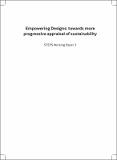| dc.contributor.author | Stirling, Andy | |
| dc.contributor.author | Leach, Melissa | |
| dc.contributor.author | Mehta, Lyla | |
| dc.contributor.author | Scoones, Ian | |
| dc.contributor.author | Smith, Adrian | |
| dc.contributor.author | Stagl, Sigrid | |
| dc.contributor.author | Thompson, John | |
| dc.date.accessioned | 2013-03-08T11:47:20Z | |
| dc.date.available | 2013-03-08T11:47:20Z | |
| dc.date.issued | 2007 | |
| dc.identifier.citation | Stirling, A., Leach, M., Mehta, L., Scoones, I., Smith, A., Stagl, S. and Thompson, J. (2007) Empowering Designs: towards more progressive appraisal of sustainability, STEPS Working Paper 3, Brighton: STEPS Centre | en_GB |
| dc.identifier.isbn | 9781858646529 | |
| dc.identifier.uri | https://opendocs.ids.ac.uk/opendocs/handle/20.500.12413/2473 | |
| dc.description.abstract | The challenges of designing new frameworks for social appraisal aimed at sustainability and social justice are reviewed by this paper. Here, ‘social appraisal’ refers to the ways society gathers knowledges to inform policy decisions and discourse and a number of key features of potentially more empowering ‘pathways’ approaches are identified. One key challenge is that poorer people are systematically excluded by power, from access to the ‘framing’ of social appraisal. This compounds the ways in which complex, uncertain, path-dependent dynamics of the social, technical and ecological systems are typically resistant to conventional narrow ‘science-based’ assessment techniques.
We argue that appraisal needs to be ‘broadened out’ in its inputs and ‘opened up’ in its outputs. The first draws on a greater diversity of knowledges, especially those of the most vulnerable, using a variety of methods to focus on complexities, uncertainties and indirect effects as seen under diverse perspectives. The ‘opening up’ of social appraisal, by contrast, requires more reflexive understandings of the roles of knowledge in governance. Rather than prescribing a particular pathway, appraisal highlights the ways in which different possible pathways correspond to divergent, but equally reasonable and legitimate, framing values and interests. Only in these ways, we argue, can appraisal designs offer steps towards more truly robust and resilient progress in meeting poorer people’s needs. | en_GB |
| dc.description.sponsorship | ESRC | en_GB |
| dc.language.iso | en | en_GB |
| dc.publisher | STEPS Centre | en_GB |
| dc.relation.ispartofseries | STEPS Working Paper;No.3 | |
| dc.rights.uri | http://creativecommons.org/licenses/by-nc-nd/3.0/ | en_GB |
| dc.subject | Development Policy | en_GB |
| dc.title | Empowering Designs: towards more progressive social appraisal of sustainability | en_GB |
| dc.type | Series paper (IDS) | en_GB |
| dc.rights.holder | STEPS Centre | en_GB |
| dc.identifier.externaluri | http://steps-centre.org/publication/empowering-designs-steps-towards-more-progressive-social-appraisal-of-sustainability/ | en_GB |
| dc.identifier.koha | 169129 | |


